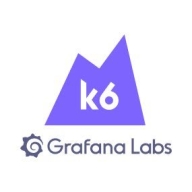

Akamai CloudTest and k6 Open Source compete in the load testing category. Based on data comparisons, k6 Open Source appears dominant due to its innovative features, despite Akamai CloudTest's competitive pricing and support advantages.
Features: Akamai CloudTest provides large-scale load testing capabilities, handles complex scenarios, and offers comprehensive analysis tools. k6 Open Source includes a modern scripting environment, seamless integration with CI/CD pipelines, and enhanced performance testing for developers.
Ease of Deployment and Customer Service: Akamai CloudTest requires more resources and time for deployment but provides robust technical support through extensive documentation and personalized assistance. k6 Open Source offers a streamlined deployment process with strong community support and readily available resources, providing flexibility and ease of use for developers.
Pricing and ROI: Akamai CloudTest has higher setup costs, providing a comprehensive testing environment justifying the expenditure for large enterprises over time. k6 Open Source minimizes upfront costs, making it attractive for startups and individual developers with its open-source model, offering significant ROI through adaptable performance metrics and rapid testing capabilities.
| Product | Market Share (%) |
|---|---|
| k6 Open Source | 4.5% |
| Akamai CloudTest | 3.4% |
| Other | 92.1% |


| Company Size | Count |
|---|---|
| Midsize Enterprise | 1 |
| Large Enterprise | 6 |
Soasta's CloudTest rapidly builds realistic test scenarios using real user data, then tests, analyzes and repairs faster. CloudTest's visual test environment and real-time analytics test your website, mobile app and api backend to give you a streaming view of all your performance data while tests run from back-end systems to front end performance.
Load Impact offers three main features:
We monitor all Load Testing Tools reviews to prevent fraudulent reviews and keep review quality high. We do not post reviews by company employees or direct competitors. We validate each review for authenticity via cross-reference with LinkedIn, and personal follow-up with the reviewer when necessary.